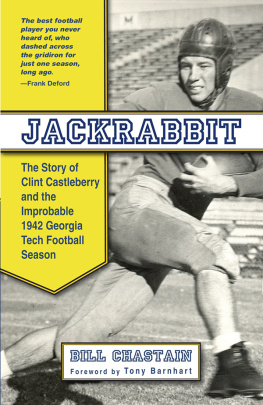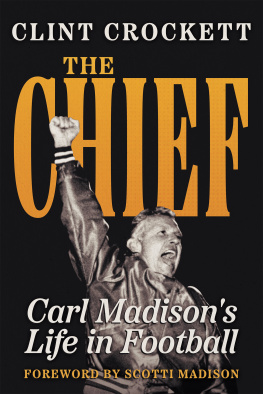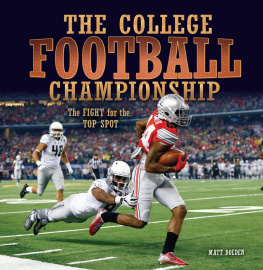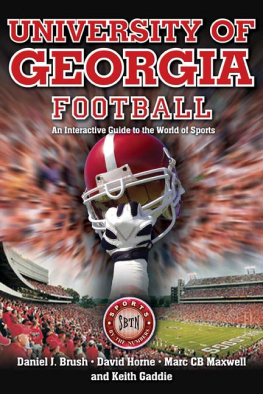Advance Praise
The best football player you never heard of, who dashed across the gridiron for just one season, long ago.
Frank Deford, Sports Illustrated and Hall of Fame sportswriter; NPR Morning Edition commentator; author of Everybodys All-American, Bliss Remembered, and Alex: The Life of a Child
Heres a great storyteller, Bill Chastain, with an oversized story to tell, about a mighty mite of a legend back when legends mattered, a high school and college sensation whose candle burned so bright and quickly. And about a time, a time just like now, when young hearts, with all those dreams inside, went to fight a war and never came back. Clint Castleberry died 66 years ago. He lives in these pages.
Martin Fennelly, The Tampa Tribune
Clint Castleberrys story is one that impacted Georgia Tech and college football in the south. Bill Chastain does a great job of capturing this unique American hero.
Wes Durham,
Director of Broadcasting,
Voice of the Yellow Jackets
Also by Bill Chastain
Nonfiction
September Nights: Hunting the Beasts of the American League East
Hack's 191: Hack Wilson's Incredible 1930 Season
The Steve Spurrier Story: From Heisman to Head Ball Coach
Payne at Pinehurst: The Greatest U.S. Open Ever
Steel Dynasty: The Team that Changed the NFL
Purpose and Passion: Bobby Pruett and the Marshall Years
100 Things Jets Fans Should Know and Do Before They Die
100 Things Giants Fans Should Know and Do Before They Die
Fiction
The Streak
Peachtree Corvette Club

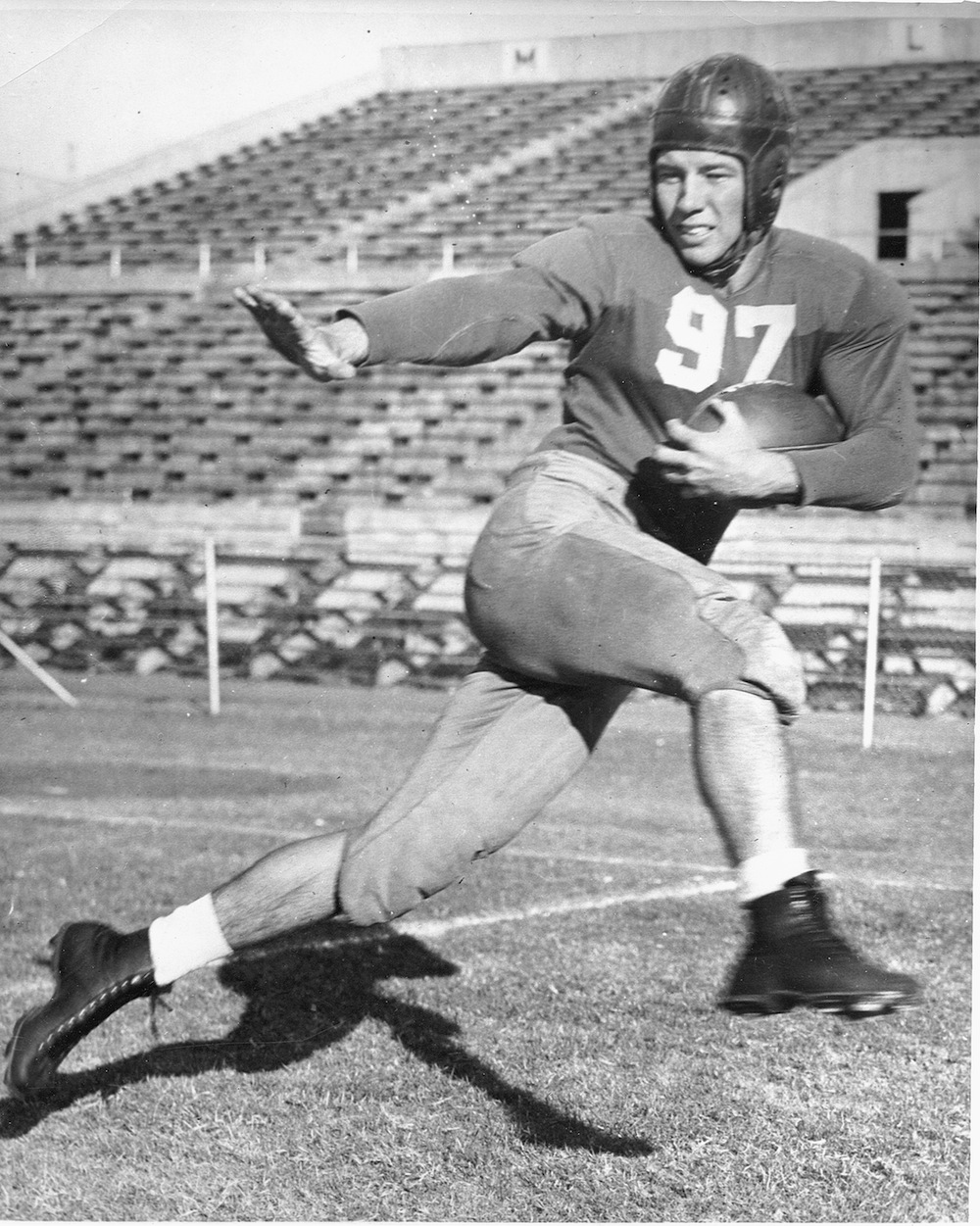
Clint Castleberry wearing a practice jersey instead of his #19 game jersey.

The Story of
Clint Castleberry
and the Improbable
1942 Georgia Tech Football Season
Bill Chastain
Foreword byTony Barnhart

All rights reserved. No part of this book may be reproduced in any form or by any electronic or mechanical means, including information storage and retrieval systems, without permission in writing from the publisher, except by a reviewer, who may quote brief passages in a review. Any members of educational institutions wishing to photocopy part or all of the work for classroom use, or publishers who would like to obtain permission to include the work in an anthology, should send their inquiries to WordSplice Studio, LLC/Cadent Publishing, 9 Gleason Street, Thomaston, ME 04861.
Printed in the United States of America
Copyright 2011 by Bill Chastain
Library of Congress Control Number: 2011943455
ISBN 9781937644055 (pbk)
ISBN 9781937644062 (eBook)
Cover and interior design by Janet Robbins, North Wind Design & Production, www.nwdpbooks.com
Cover, frontispiece, page 20, page 197 photo credit: Copyright Georgia Institute of Technology. Photo on page 205 by Pam Dickens. All other text photos courtesy Special Collections and Archives, Georgia State University Library,
Cadent Publishing
9 Gleason Street
Thomaston, ME 04861
www.cadentpublishing.com
To Pops.
Ill never quit missing you. I love you and think about you every day.
Table of Contents
Foreword
I learned a long time ago that some of the best and most interesting stories in college football are not about what was, but rather what might have been if history or circumstances had taken a different turn.
College football is full of stories about individuals who were simply in the right place at the right time with the right amount of talent to achieve success. There are countless others who appeared destined for stardom but, because of bad fortune or fate, never had a chance to fulfill their dreams.
And there is a third group, a very small group. These are men who had their journey to glory cut short but achieved immortality anyway. Thats because, in the short time they were here, their stars burned white-hot, and nothingnot even deathcould extinguish their flames.
Clint Castleberry was such a man, and in this book Bill Chastain expertly crafts one of the great what-if stories in college football history.
Castleberry was already a football legend before he got to Georgia Tech in 1942. Chastain takes the reader back to one of the great periods of high school football, when the rivalry between Atlantas Boys High and Tech High was all the rage. It was a simpler, more innocent time, and Chastain captures it perfectly.
Bill not only tells us the story of an All-America player and an all-American boy, he gives us a new look at some of the legendary names in Georgia Tech history and how they came to have an impact on the Castleberry story.
If you know Georgia Tech or college football, you certainly know the names of John Heisman, William Alexander, and Bobby Dodd. In this book Chastain gives new details on what made these men tick and how they built one of the greatest traditions in college football history.
In just one unforgettable college football season, the autumn of 1942, Clint Castleberry positioned himself to become one of the greatest players of all time. National championships were possible. At least one Heisman Trophy was all but certain. But as much as Castleberry loved college football, he loved his country more and was honor-bound to leave college and go defend it. In 1944 his plane disappeared off the African coast and was never found. His loss left a gap in Georgia Techs football legacy that remains unfilled even today.
The story of Clint Castleberry is really the story of our Greatest Generation, and Bill Chastain tells it with loving detail. You will be entertained. If you remember those days, youll shed a tear or two. And if you love college football history, I promise you will learn a lot. I know I did.
Enjoy.
TONY BARNHART
Prologue
Patriotism fueled a country at war in 1942. Pearl Harbor had changed everything. America had little appetite for war before December 7, 1941, but after that day, fright and vulnerability stoked the countrys fervor to meet the enemy. If the Japanese could attack Pearl Harbor, further attacks might take place on the mainland, and Germanys war machinedirected by a madmanlooked even more imposing than the Empire of the Rising Sun. The consequences of defeat didnt bear thinking about.
Convinced that victory was essential to preserve America and the American way of life, the nations citizens were inspired to do whatever seemed necessary to help the war effort. Scrap drives collected millions of tons of metal, rubber, and newspapers. Businesses redirected resources to the production of war materiel and support of the war effort. General Motors ceased car production and dedicated 100 percent of its production to the manufacture of military engines, trucks, tanks, airplanes, and more, with a total price tag of more than $12 billion. Sacrifice and denial moved forefront in the national psyche. Getting more out of less became the ruling mantra.

